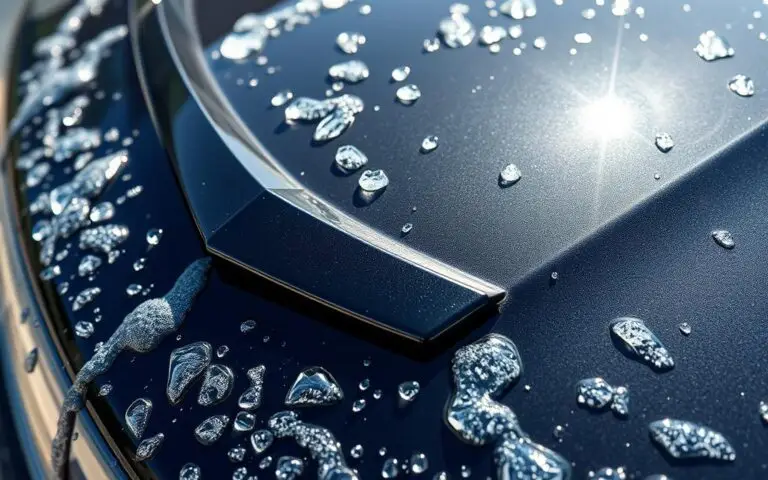Our website is dedicated to helping you take the best care of your vehicles. Whether you own a car or a motorbike, we provide helpful tips and expert advice to keep them in top condition.
How to Increase Car Mileage for Petrol: Proven Tips to Save Fuel
If you own a car in India, you know how crucial it is to boost fuel efficiency. With fuel prices going up and the need to protect our environment, learning to increase car mileage for petrol is key. Simple tips can help you cut down on fuel costs and lessen your impact on the planet.
Knowing what affects your car’s mileage and keeping up with maintenance can greatly improve fuel efficiency. This article will share effective ways to boost fuel efficiency. We’ll cover how to increase car mileage for petrol and lower fuel use.
Key Takeaways
- Improving fuel efficiency can help you save money on fuel costs
- Simple tips for better fuel economy can make a significant difference
- Regular maintenance is essential for improving fuel efficiency
- Aggressive driving habits can decrease fuel efficiency by up to 33%
- Proper tire pressure can increase fuel efficiency and improve mileage
- Using good quality fuel can lead to a 5-10% increase in fuel efficiency
- Efficient route planning can decrease fuel consumption and prevent excessive idling
Fuel Efficiency Basics
Improving your car’s mileage starts with understanding the basics. The science behind fuel consumption is complex. It involves many factors that impact your car’s fuel use.
Driving habits, vehicle maintenance, and road conditions are key. For example, underinflated tires can lower fuel efficiency by 3-5% for every 1 PSI drop. But, keeping tires at the right pressure can boost fuel economy by up to 11%.
What Affects Your Car’s Mileage
- Driving habits, such as accelerating smoothly and maintaining a steady speed
- Vehicle maintenance, including regular oil changes and tire rotations
- Road conditions, such as traffic and weather
The Science Behind Fuel Consumption
Fuel consumption science deals with how fuel is burned to move the vehicle. Engine efficiency, aerodynamics, and weight are all important. They all affect how much fuel your car uses.
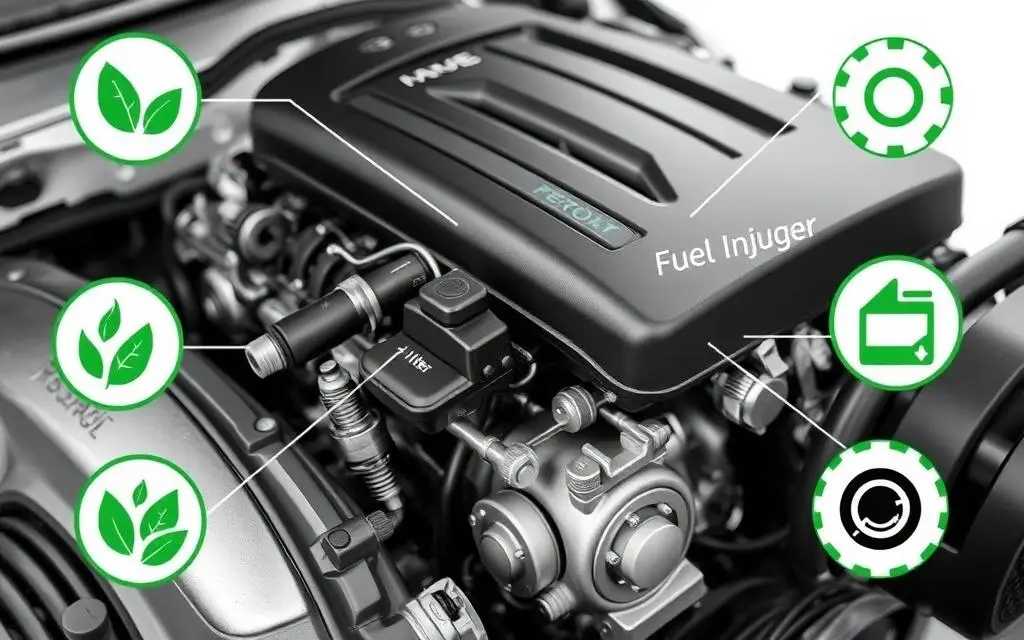
Common Mileage Myths Debunked
Many myths surround fuel efficiency and mileage. For instance, some think driving with windows open saves fuel. But, it actually increases aerodynamic drag by about 10% compared to closed windows.
Regular Maintenance: The Foundation of Better Mileage
Regular maintenance is key to better car mileage. By following car maintenance tips, your vehicle will run more efficiently. This means less fuel use and more savings for you. Plus, it helps your car last longer.
Important tasks include oil changes, tire rotations, and brake pad replacements. These keep your engine running smoothly and your car in good shape. For instance, regular oil changes boost fuel efficiency. But, misaligned wheels can cut down on gas mileage.
Here are some car maintenance tips to boost fuel efficiency:
- Check and replace air filters regularly to prevent a 10% increase in fuel usage
- Ensure proper tire inflation to improve fuel efficiency by up to 3%
- Use cruise control to maintain a constant speed and reduce fuel consumption
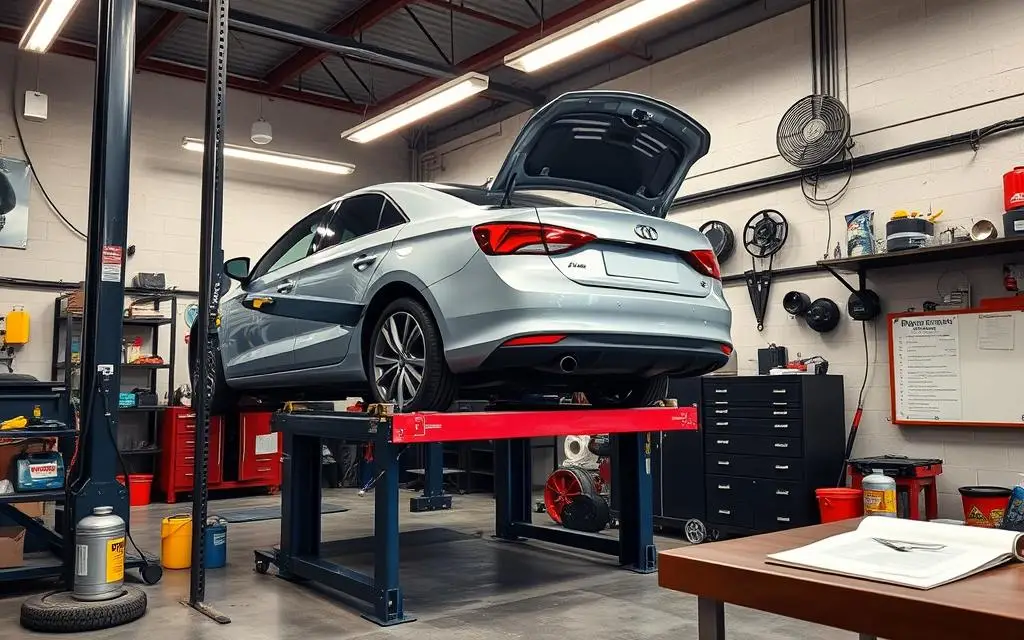
By sticking to these tips and regular maintenance, you can make your car more fuel-efficient. This leads to less fuel use and more savings. Remember, taking care of your car is the first step to better mileage and a longer vehicle life.
| Maintenance Task | Fuel Efficiency Improvement |
|---|---|
| Regular Oil Changes | Up to 4% improvement |
| Proper Tire Inflation | Up to 3% improvement |
| Air Filter Replacement | Up to 10% improvement |
How to Increase Car Mileage for Petrol Through Engine Care
Proper engine care is key to better car mileage. A regular oil change schedule keeps your engine running smoothly. This can cut down fuel use and boost your car’s mileage. Also, keeping the air filter clean is crucial as it can get clogged with dirt, hurting fuel efficiency.
Here are some tips to keep your car’s engine in top shape and boost its mileage:
- Follow the recommended oil change schedule to keep your engine well-lubricated and running smoothly.
- Check and replace the air filter regularly to ensure good airflow and prevent clogging.
- Optimize spark plug performance to improve fuel efficiency and reduce emissions.
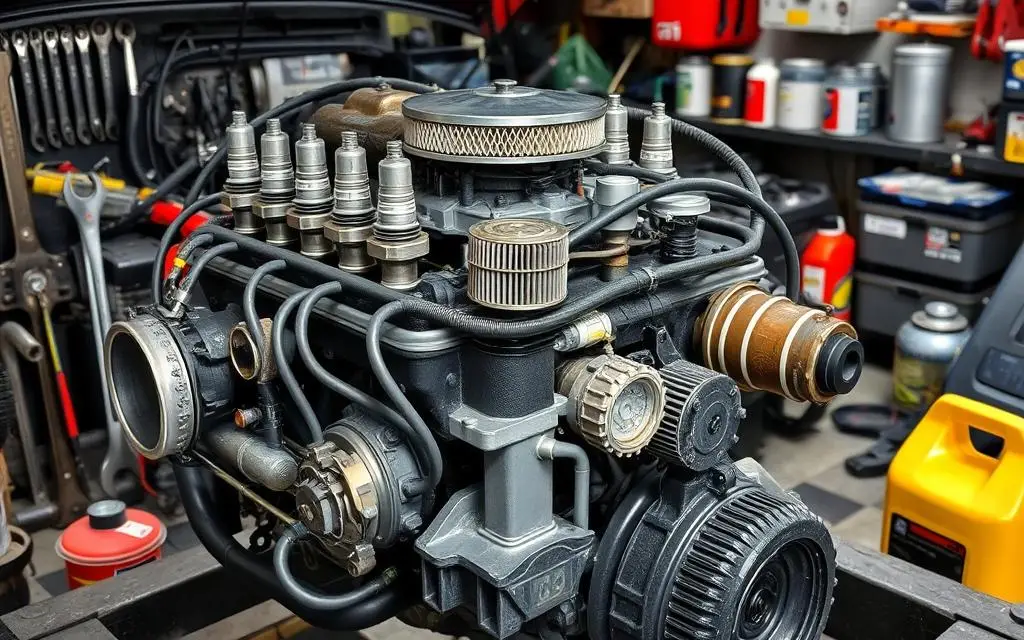
By following these simple tips, you can enhance your car’s engine care and increase its mileage. Always use top-notch engine oil and lubricants. Also, regularly check your car’s air filter and spark plugs. With the right engine care, you’ll enjoy better fuel efficiency, lower emissions, and a smoother ride.
More: Causes and Solutions for Car Overheating in the City
| Engine Care Tip | Mileage Improvement |
|---|---|
| Regular Oil Change | 5-10% |
| Air Filter Maintenance | 5-10% |
| Spark Plug Optimization | 5-10% |
Tire Care and Its Impact on Fuel Economy
Proper tire care is key to better fuel economy. Start by keeping the right tire pressure. Every 1% drop in pressure means a 0.3% fuel economy loss. Underinflated tires use more fuel, with a 10% drop leading to a 2% increase in fuel use.
To keep your tires in top shape, follow these tips:
- Check tire pressure every four weeks, as tires lose one to two PSI monthly.
- Watch out for temperature changes, as a 5 °C drop can lower tire pressure by 2%.
- Choose tires with a high energy efficiency rating, like those scoring an ‘A’, for up to 0.5 liters per 100 kilometers savings.
Also, the right tire materials, like those with more silica, can lower rolling resistance. This affects fuel use. Driving smart, like using engine braking and avoiding quick starts, also cuts fuel use. By following these steps and caring for your tires, you can boost your car’s fuel economy and cut down on fuel use.
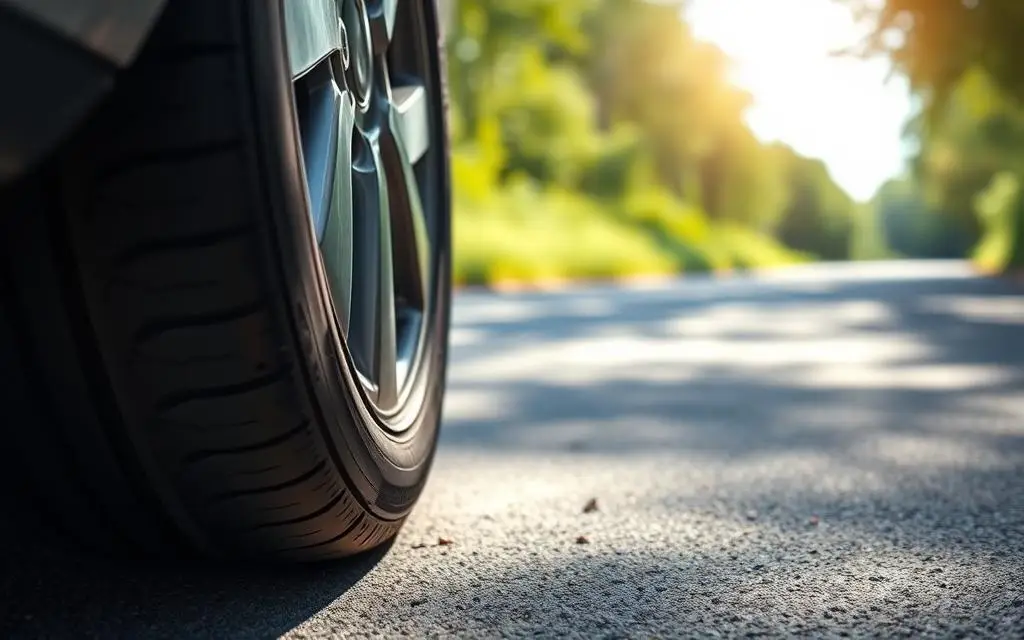
Remember, proper tire care is vital for better fuel economy. Keep the right tire pressure, use efficient tires, and drive smart. This way, you can lower fuel use and enhance your car’s performance.
Smart Driving Techniques for Maximum Efficiency
Want to make your car go further on a tank? Focus on smart driving. These techniques cut down fuel use and help the planet. Keeping your speed in check is key.
Speed matters a lot for fuel efficiency. Cars use less fuel between 50 and 80 km/h. But, speeding up can really up your fuel bill. For example, driving at 120 km/h uses 20% more fuel than at 100 km/h.
Optimal Speed Ranges
To save fuel, stick to the right speed. Here’s how:
- Accelerate slowly to 20 km/h in about 5 seconds.
- Keep a steady speed, avoiding quick starts and stops.
- Don’t speed up and down between 75 and 85 km/h every 18 seconds. It uses 20% more fuel.
More: Memory Loss After a Car Accident: Causes and Solutions
Acceleration Best Practices
How you accelerate affects fuel use. Slow starts and steady speeds save fuel. Also, coasting uses less fuel as you slow down.
Weight Management and Aerodynamics
Improving fuel efficiency involves two key areas: weight management and aerodynamics. By cutting down on extra weight and using aerodynamic features, you can boost your car’s fuel efficiency.
Carrying extra weight can cut fuel economy by about 1% for every 100 pounds. Aerodynamic drag, on the other hand, can account for over 50% of fuel use at high speeds. A lighter, more streamlined vehicle means better fuel efficiency and less environmental impact.
Here are some tips for better weight management and aerodynamics:
- Remove items you don’t need to lighten your vehicle
- Use features like spoilers or air dams to cut wind resistance
- Keep your windows up to improve aerodynamics and ease engine work
By making these changes, you can make your vehicle more fuel-efficient. Every little bit helps towards a greener future. Remember, small steps can lead to big changes over time.
The Role of Fuel Quality in Mileage Optimization
Fuel quality is key to better car mileage. The right fuel grade boosts performance and efficiency. Also, refueling at trusted stations helps a lot.
High-compression engines need the correct fuel to run well. Some cars do better with fuel additives. Choosing a reliable fuel station can increase efficiency by up to 10%.
Here are some tips for refueling best practices:
- Fill up at reputable petrol pumps to avoid fuel adulteration
- Use the correct fuel grade for your vehicle
- Avoid overfilling, as this can lead to fuel spillage and waste
By following these tips and choosing the right fuel grade, you can optimize your car’s mileage and reduce fuel consumption. Always check your vehicle’s manual for recommended fuel grades and refueling best practices.
| Fuel Grade | Fuel Efficiency |
|---|---|
| Premium | 10-15% higher |
| Regular | 5-10% lower |
Modern Technology and Fuel Efficiency Features
Looking to boost your car’s mileage? Modern tech plays a big role in fuel efficiency. Features like eco-driving modes, start-stop tech, and regenerative braking can make a big difference. They’re worth considering for better fuel use.
Some key fuel-saving features to watch for include:
- Eco-driving modes, which adjust engine and transmission for better fuel use
- Start-stop technology, which turns off the engine when idling
- Regenerative braking, which turns kinetic energy into electrical energy
Using these tech features can boost your car’s fuel efficiency. It also helps the environment. Many car makers now include these features, making it easier to find a fuel-efficient car.
When buying a new car, look for models with eco-driving modes and start-stop tech. These features improve fuel efficiency and cut emissions. It’s a win-win for you and the planet.
| Feature | Description | Benefits |
|---|---|---|
| Eco-driving modes | Adjust engine performance and transmission settings to optimize fuel efficiency | Improved fuel efficiency, reduced emissions |
| Start-stop technology | Automatically shuts off the engine when the car is idling | Reduced fuel consumption, lower emissions |
| Regenerative braking | Captures kinetic energy and converts it into electrical energy to power the car | Improved fuel efficiency, reduced emissions |
Weather Conditions and Their Effect on Mileage
Driving in different weather can really affect your car’s gas mileage. Knowing how weather changes your fuel use can help you drive better. For example, warm summer weather can make your car use less gas. But, it also means you need to keep your tires right and follow summer driving tips.
When it rains, your car might use more gas because of slippery roads. To fight this, slow down and use low gear. Also, knowing the weather and driving smart can really help your car’s gas use.
- Slow down to save gas in bad weather
- Keep your tires at the right pressure for better grip
- Don’t drive too fast or brake hard
- Use special driving tips for summer and monsoon seasons
By paying attention to the weather and driving wisely, you can save gas. Whether it’s hot summer or rainy monsoon, knowing how weather affects your car can help you drive better.
Traffic Navigation Strategies for Better Mileage
Improving your car’s mileage is easier with the right traffic navigation. By avoiding busy roads and keeping a steady speed, you can save fuel. Using GPS to steer clear of traffic and choosing different routes are great ways to do this.
Here are some key strategies for better traffic navigation:
- Use apps like Google Maps or Waze to find the best routes.
- Stay away from busy times to avoid stop-and-go driving.
- Keep your speed steady to use less fuel.
These tips can make your car more fuel-efficient. They also cut down on fuel use and driving costs. Plus, avoiding traffic helps your car last longer and saves on repairs.
More: Secrets to Perfectly Cleaning Tinted Windows
| Strategy | Benefits |
|---|---|
| Traffic Navigation | Improved fuel efficiency, reduced fuel consumption |
| Traffic Avoidance | Reduced wear and tear, lower maintenance costs |
| Consistent Speed | Minimized fuel consumption variations, improved overall driving experience |
Advanced Modifications for Improved Efficiency
Looking to boost your vehicle’s fuel efficiency? Advanced modifications can help. These include legal changes like a cold air intake and professional tuning. Such upgrades can up your fuel savings and cut down on pollution.
Some top advanced modifications are:
- Engine tuning: This adjusts the engine’s computer for better fuel use and performance.
- Aerodynamic enhancements: Adding a spoiler or side skirts cuts wind resistance and boosts fuel efficiency.
- Weight reduction: Taking out extra weight improves fuel use and handling.
Choosing reputable providers is key for safe and effective modifications. Professional tuning fits your car and driving style. Combining these with smart driving and upkeep can lead to big fuel savings and lower costs.
- Chip tuning: This reprograms the engine’s computer for better fuel use and performance.
- Exhaust system upgrades: A high-performance exhaust system reduces backpressure and boosts fuel efficiency.
- Suspension upgrades: A performance suspension system enhances handling and reduces weight.
Exploring these advanced modifications and professional tuning can elevate your fuel efficiency. This leads to long-term cost savings. Always check local laws and seek professional advice if needed.
Common Mistakes That Reduce Fuel Efficiency
Improving your car’s mileage is important. Knowing common mistakes that cut down fuel efficiency is key. These errors come from how you drive, car maintenance, and other areas. By spotting these mistakes, you can fix them and save fuel.
Aggressive driving, poor maintenance, and ignoring regular checks are common errors. For example, idling for too long wastes fuel and harms the environment. A dirty air filter also lowers engine power, making you use more fuel.
To steer clear of these mistakes, try these tips:
- Turn off your engine when waiting at lights for a while.
- Regularly check your tire pressure to keep it at the right level.
- Don’t carry extra weight in your car, as it cuts down fuel efficiency.
- Use high-quality fuel to protect your engine and save fuel.
Being aware of these mistakes and acting on them can improve your driving and fuel use. Remember, regular maintenance and care are crucial for better car mileage.
Monitoring and Tracking Your Mileage Improvements
As you work on increasing your car’s mileage, it’s key to keep track of your progress. You can use digital tools or write it down by hand. This way, you can see where you need to get better and make smart choices to save fuel.
There are many digital tools to help you track your mileage. Apps like Fuel Buddy and Fuelly can show you how much you’re using. They help you see patterns in your fuel use, so you can cut down on costs.
Digital Tracking Tools
Digital tools make tracking easy and accurate. They offer:
- Accurate mileage tracking
- Real-time data collection
- Personalized insights into your driving habits
- Integration with other apps and services
Manual Recording Methods
Manual methods are also good for tracking mileage. Just write down your mileage when you fill up or at trip’s end. This way, you can spot trends in your fuel use and make changes to save fuel.
Using both digital tools and manual methods helps you understand your mileage better. It’s a key step to saving fuel or driving more efficiently. Monitoring and tracking your mileage is crucial for reaching your goals.
Conclusion: Making Fuel Efficiency a Daily Habit
Improving your car’s mileage is a long-term goal, not just a quick fix. By making fuel efficiency a daily habit, you can make your car run better. You’ll also save money and help the environment.
Start by driving smoothly and braking right. Try to do all your errands in one trip. Also, check your tyre pressure and air filters often. These small steps can make a big difference in your car’s fuel efficiency.
Follow the tips from this article to control your car’s fuel use. Every saved mile helps. So, make fuel efficiency a key part of your driving life. Enjoy the benefits of a more efficient, cost-effective, and green driving experience.
FAQ
What are the key benefits of improving car mileage for petrol vehicles?
Improving car mileage for petrol vehicles saves money on fuel. It also reduces environmental harm by lowering emissions. Plus, you can drive longer before needing to refuel.
What are the main factors that affect a car’s mileage?
Several things affect a car’s mileage. These include how you drive, keeping the vehicle in good shape, and the engine’s performance. Tire condition and the environment also play a role.
How does regular vehicle maintenance help improve fuel efficiency?
Regular maintenance is key. It includes oil changes, air filter replacements, and tire rotations. These steps keep the engine running well and save fuel.
What are the best engine care practices to increase petrol car mileage?
For better engine care, follow the oil change schedule. Keep the air filter clean and ensure spark plugs work well. This helps fuel burn efficiently.
How does tire care impact fuel economy?
Tire care is crucial. Keep the right tire pressure, rotate tires, and avoid overloading. These steps boost fuel efficiency.
What are some smart driving techniques that can boost fuel efficiency?
Smart driving includes driving at the right speed and using efficient acceleration and braking. These habits improve fuel use.
How does weight management and aerodynamics affect fuel economy?
Less weight and better aerodynamics cut down fuel use. They help your car go further on a tank of gas.
What is the role of fuel quality in optimizing mileage?
Fuel quality matters. Choose the right fuel and avoid overfilling the tank. This boosts mileage and efficiency.
How can modern technology and fuel efficiency features enhance mileage?
Modern tech and features like eco-modes and advanced engines improve fuel economy. They make your car more fuel-efficient.
How do weather conditions impact a car’s mileage?
Weather affects mileage. Extreme temperatures, rain, and wind can change how your car performs. They impact engine, tire, and aerodynamics.
What traffic navigation strategies can help improve mileage?
Use GPS to dodge traffic and take alternative routes. Keeping a steady speed also helps. These strategies save fuel.
What advanced modifications can be made to boost fuel efficiency?
Legal tweaks like engine tuning and aerodynamic parts can improve fuel use. Professional tuning also offers benefits.
What common mistakes can reduce fuel efficiency?
Aggressive driving, idling too long, extra weight, and neglecting maintenance harm fuel efficiency. Avoid these to save fuel.
How can you monitor and track your mileage improvements?
Use digital tools like apps and in-car displays, or keep a manual log. These methods help track your mileage gains.



